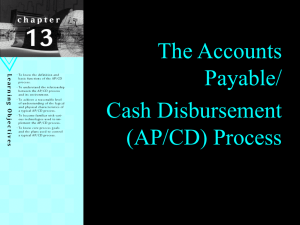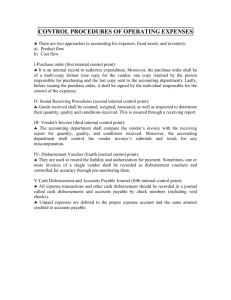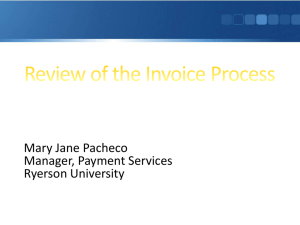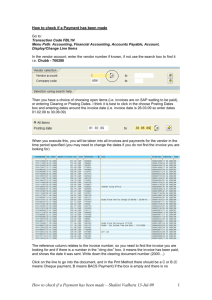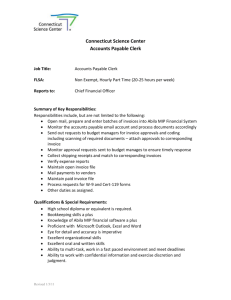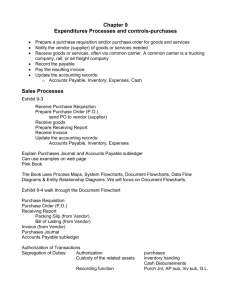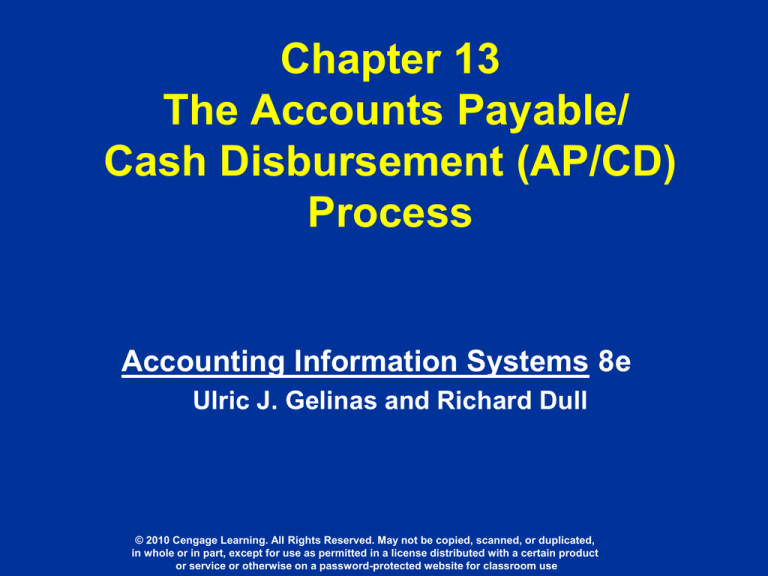
Chapter 13
The Accounts Payable/
Cash Disbursement (AP/CD)
Process
Accounting Information Systems 8e
Ulric J. Gelinas and Richard Dull
© 2010 Cengage Learning. All Rights Reserved. May not be copied, scanned, or duplicated,
in whole or in part, except for use as permitted in a license distributed with a certain product
or service or otherwise on a password-protected website for classroom use
Learning Objectives
• Describe the relationship between the AP/CD
process and its business environment.
• Summarize how various technologies, including einvoicing and e-payments, can improve the
effectiveness of the AP/CD process.
• Depict the logical and physical characteristics of a
typical AP/CD process.
• Prepare a control matrix for a typical AP/CD process
including an explanation of how business process
control plans can accomplish operations and
information process control goals.
2
Process Definitions and
Functions
•
The accounts payable/cash disbursements (AP/CD)
process is an interacting structure of people,
equipment, methods, and controls that is designed to
accomplish the following primary functions:
1. Handle the repetitive work routines of the accounts
payable department and the cashier.
2. Support the decision needs of those who manage the
accounts payable department and cashier.
3. Assist in the preparation of internal and external
reports.
3
AP/CD Horizontal Perspective
1.
Invoice
received
from
vendor.
4
AP/CD Horizontal Perspective
2.
Invoice
notice
sent to
general
ledger.
5
AP/CD Horizontal Perspective
3.
Approved
voucher
(payment
request) sent
to cashier
(3a) and to
general
ledger (3b).
6
AP/CD Horizontal Perspective
4.
Payment (e.g.,
check) sent to
vendor by
cashier (4a), paid
voucher
(payment notice)
returned to the
accounts payable
department (4b),
payment notice
to the general
ledger (4c).
7
AP/CD Vertical Perspective
8
The AP/CD Process - Level 0 Diagram
9
AP/CD Process - Diagram 1:
Validate Invoice
10
A Sample Purchase Order Screen
11
AP/CD Process - Diagram 2:
Cash Disbursements
12
Processing Non-Invoiced
Disbursements
• In some cases disbursements are not
invoiced, e.g., freight bills, rent, payroll.
• The handling of non-invoiced disbursements
depends on whether or not a voucher system
is used.
• A voucher system prepares a voucher for
every expenditure from payroll to purchases
of raw materials.
13
Processing
Non-invoiced
Disbursements
14
Logical Data Descriptions for
the AP/CD Process
• Accounts payable master data. This data store is a repository of all
unpaid vendor invoices.
– The data design should consider how the data will be processed when the
cash manager is deciding what payments to make.
– The manager may want to merge vendor invoices so that the total amount
due each vendor can be accumulated.
– Alternatively, the manager might want to select specific invoices for
payment.
• Cash disbursements data. The purpose of this data is to show, in
chronological sequence, the details of each cash payment made.
– Each record in this data normally shows the date the payment is recorded,
vendor identification, disbursement voucher number (if a voucher process
is used), vendor invoice number and gross invoice amount, cash discount
taken on each invoice, net invoice amount, check amount, and check
number.
15
EntityRelationship
(E-R)
Diagram
(Partial) for
the AP/CD
Process
16
AP/CD Process Relational Tables
17
AP/CD Process Relational Tables
(continued)
18
Technology Trends and
Developments
• E-invoicing - the processing of invoices in
electronic form
– Scan documents
– Use purchasing cards (p-cards)
– Invoices can be submitted electronically
• E-payments - the electronic submission of
payments
– EDI and XML-based technologies
– Settled through the ACH network, wire transfer
or credit card
19
AP/CD Process: Systems Flowchart
20
Purchase Returns and Allowances
• Sometimes defective goods are returned or an
allowance is made for non-conforming items.
• This exception routine usually begins at the point of
inspecting and counting the goods or at the point of
validating vendor invoices.
• Purchaser transmits a debit memo to the vendor
requesting the account adjustment.
• Vendor responds with a credit memo indicating the
authorized account adjustment.
21
AP/CD Fraud
• AP fraud usually involve
fictitious vendors and
false invoices
– A dishonest employee
with access to the vendor
file authorizes fictitious
payment
– May embezzle amounts
refunded by vendors
– Human error is still a
leading cause of loss
• CD fraud is less
sophisticated
– Usually involves check
fraud
– Takes many forms from
stealing and passing
stolen checks to
changing amounts on
legitimate checks or
check forgery
– Easier and more
common with computer
duplication technology
22
Exposure to Loss and
Destruction of Resources
• Resource losses due to unintentional mistakes and
inadvertent errors are as costly as, or more costly,
than those caused by intentional acts of fraud.
• Examples include:
– Making payments for incorrect amounts
– Paying the wrong vendor
– Paying the same invoice twice
23
AP/CD Control Matrix
24

